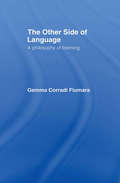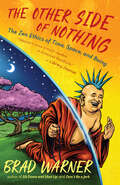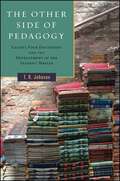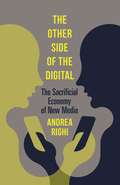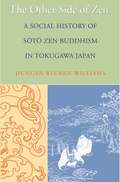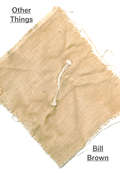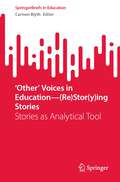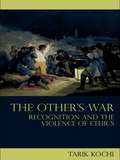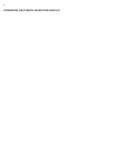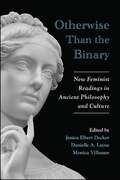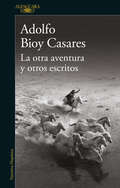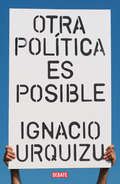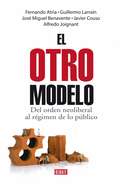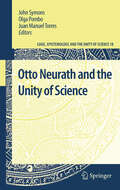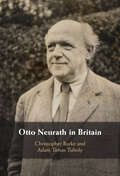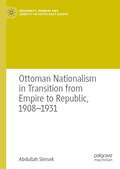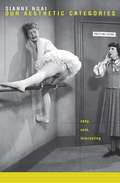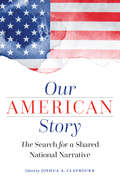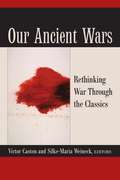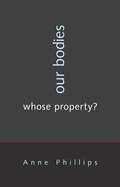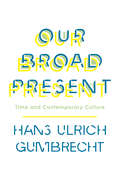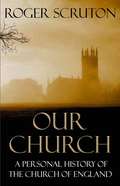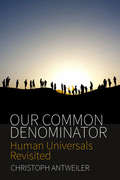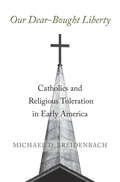- Table View
- List View
The Other Side of Language: A Philosophy of Listening
by Gemma Corradi FiumaraFirst published in 1990. Routledge is an imprint of Taylor & Francis, an informa company.
The Other Side of Nothing: The Zen Ethics of Time, Space, and Being
by Brad WarnerA reader-friendly guide to Zen Buddhist ethics for modern times In the West, Zen Buddhism has a reputation for paradoxes that defy logic. In particular, the Buddhist concept of nonduality — the realization that everything in the universe forms a single, integrated whole — is especially difficult to grasp. In The Other Side of Nothing, Zen teacher Brad Warner untangles the mystery and explains nonduality in plain English. To Warner, this is not just a philosophical problem: nonduality forms the bedrock of Zen ethics, and once we comprehend it, many of the perplexing aspects of Zen suddenly make sense. Drawing on decades of Zen practice, he traces the interlocking relationship between Zen metaphysics and ethics, showing how a true understanding of reality — and the ultimate unity of all things — instills in us a sense of responsibility for the welfare of all beings. When we realize that our feeling of separateness from others is illusory, we have no desire to harm any creature. Warner ultimately presents an expansive overview of the Zen ethos that will give beginners and experts alike a deeper understanding of one of the world’s enduring spiritual traditions.
The Other Side of Pedagogy: Lacan's Four Discourses and the Development of the Student Writer (SUNY series, Transforming Subjects: Psychoanalysis, Culture, and Studies in Education)
by T. R. JohnsonUniversity classrooms are increasingly in crisis—though popular demands for accountability grow more insistent, no one seems to know what our teaching should seek to achieve. This book traces how we arrived at our current impasse, and it uses Lacan's theory of the four discourses to chart a path forward via an analysis of the freshman writing class. How did we forfeit a meaningful set of goals for our teaching? T. R. Johnson suggests that, by the 1960s, the work of Bergson and Piaget had led us to see student growth as a journey into more and more abstract thought, a journey that will happen naturally if the teacher knows how to stay out of the way. Since the 1960s, we've come to see development, in turn, only as a vague initiation into the academic community. This book, however, offers an alternative tradition, one rooted in Vygotsky and the feminist movement, that defines the developing student writer in terms of a complex, intersubjective ecology, and then, through these precedents, proposes a fully psychoanalytic model of student development. To illustrate his practical use of the four discourses, Johnson draws on a wide array of concepts and a colorful set of examples, including Franz Kafka, Keith Richards, David Foster Wallace, Hannah Arendt, and many others.
The Other Side of the Digital: The Sacrificial Economy of New Media
by Andrea RighiA necessary, rich new examination of how the wired world affects our humanity Our tech-fueled economy is often touted as a boon for the development of our fullest human potential. But as our interactions are increasingly turned into mountains of data sifted by algorithms, what impact does this infinite accumulation and circulation of information really have on us? What are the hidden mechanisms that drive our continuous engagement with the digital?In The Other Side of the Digital, Andrea Righi argues that the Other of the digital acts as a new secular God, exerting its power through endless accountability that forces us to sacrifice ourselves for the digital. Righi deconstructs the contradictions inherent in our digital world, examining how ideas of knowledge, desire, writing, temporality, and the woman are being reconfigured by our sacrificial economy. His analyses include how both our self-image and our perception of reality are skewed by technologies like fitness bands, matchmaking apps, and search engines, among others.The Other Side of the Digital provides a necessary, in-depth cultural analysis of how the political theology of the new media functions under neoliberalism. Drawing on the work of well-known thinkers like Jacques Derrida, Jacques Lacan, and Ludwig Wittgenstein, as well as Carla Lonzi, Luisa Muraro, and Luciano Parinetto, Righi creates novel appraisals of popular digital tools that we now use routinely to process life experiences. Asking why we must sign up for this sort of regime, The Other Side of the Digital is an important wake-up call to a world deeply entangled with the digital.
The Other Side of Zen: A Social History of Sōtō Zen Buddhism in Tokugawa Japan (Buddhisms: A Princeton University Press Series #10)
by Duncan Ry?ken WilliamsPopular understanding of Zen Buddhism typically involves a stereotyped image of isolated individuals in meditation, contemplating nothingness. This book presents the "other side of Zen," by examining the movement's explosive growth during the Tokugawa period (1600-1867) in Japan and by shedding light on the broader Japanese religious landscape during the era. Using newly-discovered manuscripts, Duncan Ryuken Williams argues that the success of Soto Zen was due neither to what is most often associated with the sect, Zen meditation, nor to the teachings of its medieval founder Dogen, but rather to the social benefits it conveyed.Zen Buddhism promised followers many tangible and attractive rewards, including the bestowal of such perquisites as healing, rain-making, and fire protection, as well as "funerary Zen" rites that assured salvation in the next world. Zen temples also provided for the orderly registration of the entire Japanese populace, as ordered by the Tokugawa government, which led to stable parish membership.Williams investigates both the sect's distinctive religious and ritual practices and its nonsectarian participation in broader currents of Japanese life. While much previous work on the subject has consisted of passages on great medieval Zen masters and their thoughts strung together and then published as "the history of Zen," Williams' work is based on care ul examination of archival sources including temple logbooks, prayer and funerary manuals, death registries, miracle tales of popular Buddhist deities, secret initiation papers, villagers' diaries, and fund-raising donor lists.
Other Things
by Bill BrownFrom the pencil to the puppet to the drone--the humanities and the social sciences continue to ride a wave of interest in material culture and the world of things. How should we understand the force and figure of that wave as it shapes different disciplines? Other Things explores this question by considering a wide assortment of objects--from beach glass to cell phones, sneakers to skyscrapers--that have fascinated a range of writers and artists, including Virginia Woolf, Man Ray, Spike Lee, and Don DeLillo. The book ranges across the literary, visual, and plastic arts to depict the curious lives of things. Beginning with Achilles's Shield, then tracking the object/thing distinction as it appears in the work of Martin Heidegger and Jacques Lacan, Bill Brown ultimately focuses on the thingness disclosed by specific literary and artistic works. Combining history and literature, criticism and theory, Other Things provides a new way of understanding the inanimate object world and the place of the human within it, encouraging us to think anew about what we mean by materiality itself.
‘Other’ Voices in Education—: Stories as Analytical Tool (SpringerBriefs in Education)
by Carmen BlythThis book explores how stories can be used as ‘data’ that prefigure and make possible the numerous permutations of life that comprise existence, and examines how stories can be reconfigured to transform that existence into something 'other'. It uses varied theoretical and critical frameworks such as autoethnography and posthumanism with which to explore the stories shared that go ‘beyond cause and effect’. This book looks to engage with storying and storytelling as inquiry in non-Western ‘worlds’, and looks to make ‘storying’, ‘restor(y)ing’, and ‘stories’ written by non-Western educators the locus of attention. By doing so, it seeks to illustrate what distinctive ways of storying and storytelling can look like in worlds other than those that follow a Western ethico-onto-epistemological worldview. It provides a way to articulate thought that may be commonly omitted in teacher education around the world, and looks at ‘truth’ as situated rather than as totality, local rather than global, with stories used to problematize subject/object positionings within those same stories.
The Other's War: Recognition and the Violence of Ethics (Birkbeck Law Press)
by Tarik KochiThe Other's War is an intervention into a set of contemporary moral, political and legal debates over the legitimacy of war and terrorism within the context of the so-called global War on Terror. Tarik Kochi considers how, despite the variety of its approaches – just war theory, classical realist, post-Kantian, poststructuralist – contemporary ethical, political and legal philosophy still struggles to produce a convincing account of war. Focusing on the philosophical problem of the rightness of war, The Other's War responds to this lack. Through a discussion of a number of key Western intellectual traditions, Kochi demonstrates how often conflicting and contradictory conceptions of war’s rightness have developed in modernity. He shows how a process of ordering violence around different notions of right has constantly redrawn the boundaries of what constitutes ‘legitimate’ violence. Such a process has consequences for anyone who claims to be fighting a ‘just war’. Building upon this account and drawing upon the philosophical heritage of G.W.F. Hegel and Ernst Bloch, The Other’s War proposes a new understanding of war, not just as a social condition characterised by violent conflict and struggles for power, but as the attempt of individuals and groups to realise their normative claims through violence. Kochi argues that both of these aspects of war are an expression of the metaphysics of human subjectivity. War begins with, and is the radical exaggeration of, a fundamental activity of human subjectivity, in which the subject constitutes its normative and material identity; realising and positing itself through acts that involve negation and violence. By drawing consideration of the problem of war back to the level of a philosophical examination of the metaphysics of human subjectivity, The Other's War develops a novel theory of war that helps us to better understand the nature of contemporary conflict as a process of recognition. From this perspective, judgment, it is concluded, needs to be constantly guided by the effort to recognise the ethics of the other's war.
Otherwise Than Being or Beyond Essence
by Emmanuel Levinas Alphonso Lingis Richard A. CohenOtherwise than Being, or Beyond Essence, first published in 1974, is the second of Levinas's mature philosophical works, the first being Totality and Infinity (first published in 1961). Otherwise than Being is essentially the sequel to Totality and Infinity, further elaborating the rich and comprehensive philosophy of ethical metaphysics that Levinas had introduced in the earlier work. <P><P>At the heart of Levinas's writings is the irreducible ethical proximity of one human being to another morality, and through that encounter a relation to all others justice. Otherwise than Being emphasizes the themes of moral sensibility and language within this system of ethical metaphysics. These themes had been introduced in Totality and Infinity, but are developed in this later work. And while Totality is focused on ethical alterity, Otherwise is focused on ethical subjectivity. The process of the revelation of Being as laid out by modern phenomenological ontology is severely criticized, as Levinas claims that the ultimate account of these phenomena is not in ontology, but in a paradoxical discourse of what is beyond Being.
Otherwise Than the Binary: New Feminist Readings in Ancient Philosophy and Culture (SUNY series in Ancient Greek Philosophy)
by Jessica Elbert Decker; Danielle A. Layne; Monica VilhauerOtherwise Than the Binary approaches canonical texts and concepts in Ancient Greek philosophy and culture that have traditionally been understood as examples of binary thinking, particularly concerning sexual difference. In contrast to such patriarchal logic, the essays within this volume explore how many of these seemingly strict binaries in ancient culture and thought were far more permeable and philosophically nuanced. Each contribution asks if there are ways of thinking of antiquity differently—namely, to examine canonical works through a lens that expounds and even celebrates philosophies of difference so as to discover instances where authors of antiquity valorize and uphold the necessity of what has been seen as feminine, foreign, and/or irrational. As contemporary thinkers turn toward new ways of reading antiquity, these selected studies will inspire other readings of ancient texts through new feminist methodologies and critical vantage points. When examining the philosophers and notable figures of antiquity alongside their overt patriarchal and masculinist agendas, readers are invited to rethink their current biases while also questioning how particular ideas and texts are received and read.
La otra aventura y otros escritos
by Adolfo Bioy CasaresLa otra aventura y otros escritos reúne cinco obras de no ficción que escribió Bioy Casares en diferentes años entre 1968 y 1999. Inaugura este volumen de no ficción La otra aventura (1968), una serie de prólogos y artículos de Bioy entre los que se destacan un análisis en torno a la originalidad de La Celestina y una valiosa nota sobre su amistad con Borges; en Memoria sobre la pampa y los gauchos (1970) Bioy explora las múltiples resonancias de esas palabras que a él le despiertan ansiedad pero «para la mayoría de los argentinos son de uso turístico»; el hilarante y satírico Diccionario del argentino exquisito (1971) incluye verdaderos hallazgos; Unos días en el Brasil (1991), el diario de un viaje realizado en 1960 en el contexto de un congreso del PEN Club, y De las cosas maravillosas (1999), reflexión luminosa que tiene como objetivo ayudar a conocernos mejor.
Otra política es posible
by Ignacio UrquizuUna inmersión en la vida política moderna española que ofrece un diagnóstico de la situación actual y presenta un modo distinto de hacer política. Todas las experiencias que he vivido desde que entré en política en 2015, como diputado en el Congreso, diputado autonómico y alcalde, me invitan a pensar que hay otra forma de ejercer la responsabilidad política. Es posible rehuir la polarización y la crispación, y además obtener como recompensa la confianza de los ciudadanos. Nos hemos acostumbrado a demonizar al adversario, a los posicionamientos extremos y a la negación del que no piensa como nosotros. Este libro es un ensayo que defiende todo lo contrario: ponerse en el lugar de los demás para tratar de alcanzar los puntos de acuerdo. Para mí, la empatía es una característica fundamental de cualquier político. Si echamos la vista atrás, veremos que es un punto de partida desde el que hacer política que han practicado muchos dirigentes de nuestro país, aunque mientras la ejercieron sufrieron la incomprensión de los propios y la persecución de los adversarios. Eso sí, la ciudadanía se reconocía en ellos. Hay otra forma de hacer política, y su defensa es lo que va a encontrar el lector en estas páginas. Ignacio Urquizu
El otro modelo: Del orden neoliberal al régimen de lo público
by FERNANDO ATRIAUn análisis acerca del malestar generalizado que existe con motivo del modelo político actual y una propuesta concreta de un nuevo proyecto político para Chile. ¿Está agotado el modelo de desarrollo chileno? Quizás sea esta la pregunta política más candente en la actualidad. Los cinco destacados autores de este libro se abocan a contestarla con una argumentada y novedosa propuesta para el país. De la mano de las movilizaciones estudiantiles desde 2011 -sumadas a muchas otras que surgieron en distintos ámbitos- cientos de miles de ciudadanos han expresado su malestar por la mala educación, por la desigualdad, por la falta de representatividad política, por el sistema de salud, por las AFP, por la manera en que se aprueban los proyectos energéticos y sus impactos medio ambientales. Luego de demostrar la radicalidad neoliberal de las políticasimplementadas en las últimas décadas, El otro modelo propone un ordenamiento distinto, para lo cual son necesarias -a juicio de estos autores- profundas reformas políticas, sociales y económicas, como la eliminación del sistema electoral binominal, una nueva Constitución y un enfoque renovado para la provisión de derechos sociales. El objetivo es que se transite desde el orden neoliberal, en el que las instituciones minimizanla figura del ciudadano, hacia un régimen de lo público, donde este debe situarse en el corazón de la democracia. El otro modelo es una propuesta fundacional para sembrar las bases del Chile del futuro.
Otto Neurath and the Unity of Science
by Olga Pombo John Symons Juan Manuel TorresThis volume critically reexamines Otto Neurath's conception of the unity of science. Some of the leading scholars of Neurath's work, along with many prominent philosophers of science critically examine his place in the history of philosophy of science and evaluate the relevance of his work for contemporary debates concerning the unity of science.
Otto Neurath in Britain
by Christopher Burke Adam Tamas TubolyOtto Neurath (1882–1945) was an Austrian-born philosopher of science, sociologist and political economist, and one of the most multi-faceted and creative thinkers in the Vienna Circle. Forced into exile by fascism, he was part of the intellectual exodus from Central Europe. After an adventurous escape to England and internment as an 'enemy alien', he enthusiastically adapted to British culture, working on documentary films and publications for the war effort using the Isotype method of visualization. He treasured the British habit of 'muddling through', and debated planning and economics with fellow Central European émigrés, Friedrich Hayek, Karl Mannheim and Karl Popper. Based on new archival research, this book explores a little-known period of Neurath's rich and fascinating life, weaving together biographical, historical, and philosophical strands that reflect the cross-cultural currents of twentieth-century intellectual history through the lens of Neurath's contribution.
Ottoman Nationalism in Transition from Empire to Republic, 1908–1931 (Modernity, Memory and Identity in South-East Europe)
by Abdullah SimsekThis book deals with the complex process of national identity formation in the late Ottoman Empire and early Turkish Republic, during a crucial period characterized by transformative events that reshaped both the state and society. These events included revolutions, wars, mass migrations, ethnic cleansing, genocide, the empire's disintegration, territorial and demographic changes, and the emergence of new states. In the face of these events, a multitude of old and new formulations and imaginings of nation and national identity took shape and interacted with each other. This book focuses on highlighting the diversity of concepts and trajectories that existed during the period and how these played out within a complex web of inclusionary and exclusionary processes, and the various ways in which the nation was constituted and conceptualized.
Our Aesthetic Categories: Zany, Cute, Interesting
by Sianne NgaiIn this radiant study, Sianne Ngai offers a theory of the aesthetic categories that most people use to process the hypercommodified, mass-mediated, performance-driven world of late capitalism, treating them with the same seriousness philosophers have reserved for analysis of the beautiful and the sublime.
Our American Story: The Search for a Shared National Narrative
by Joshua A. ClaybournOver the past few decades, the complicated divides of geography, class, religion, and race created deep fractures in the United States, each side fighting to advance its own mythology and political interests. We lack a central story, a common ground we can celebrate and enrich with deeper meaning. Unable to agree on first principles, we cannot agree on what it means to be American. As we dismantle or disregard symbols and themes that previously united us, can we replace them with stories and rites that unite our tribes and maintain meaning in our American identity? Against this backdrop, Our American Story features leading thinkers from across the political spectrum—Jim Banks, Pulitzer Prize–winner David W. Blight, Spencer P. Boyer, Eleanor Clift, John C. Danforth, Cody Delistraty, Richard A. Epstein, Nikolas Gvosdev, Cherie Harder, Jason Kuznicki, Gerard N. Magliocca, Markos Moulitsas, Ilya Somin, Cass R. Sunstein, Alan Taylor, James V. Wertsch, Gordon S. Wood, and Ali Wyne. Each draws on expertise within their respective fields of history, law, politics, and public policy to contribute a unique perspective about the American story. This collection explores whether a unifying story can be achieved and, if so, what that story could be.
Our Ancient Wars: Rethinking War Through The Classics
by Victor Caston Silke-Maria WeineckMany famous texts from classical antiquity-by historians like Thucydides, tragedians like Sophocles and Euripides, the comic poet Aristophanes, the philosopher Plato, and, above all, Homer-present powerful and profound accounts of wartime experience, both on and off the battlefield. These texts also provide useful ways of thinking about the complexities and consequences of wars throughout history, and the concept of war broadly construed, providing vital new perspectives on conflict in our own era. Our Ancient Wars features essays by top scholars from across academic disciplines- classicists and historians, philosophers and political theorists, literary scholars, some with firsthand experience of war and some without-engaging with classical texts to understand how differently they were read in other times and places. Contributors articulate difficult but necessary questions about contemporary conceptions of war and conflict. Book jacket.
Our Bodies, Whose Property?
by Anne PhillipsAn argument against treating our bodies as commoditiesNo one wants to be treated like an object, regarded as an item of property, or put up for sale. Yet many people frame personal autonomy in terms of self-ownership, representing themselves as property owners with the right to do as they wish with their bodies. Others do not use the language of property, but are similarly insistent on the rights of free individuals to decide for themselves whether to engage in commercial transactions for sex, reproduction, or organ sales. Drawing on analyses of rape, surrogacy, and markets in human organs, Our Bodies, Whose Property? challenges notions of freedom based on ownership of our bodies and argues against the normalization of markets in bodily services and parts. Anne Phillips explores the risks associated with metaphors of property and the reasons why the commodification of the body remains problematic.What, she asks, is wrong with thinking of oneself as the owner of one's body? What is wrong with making our bodies available for rent or sale? What, if anything, is the difference between markets in sex, reproduction, or human body parts, and the other markets we commonly applaud? Phillips contends that body markets occupy the outer edges of a continuum that is, in some way, a feature of all labor markets. But she also emphasizes that we all have bodies, and considers the implications of this otherwise banal fact for equality. Bodies remind us of shared vulnerability, alerting us to the common experience of living as embodied beings in the same world.Examining the complex issue of body exceptionalism, Our Bodies, Whose Property? demonstrates that treating the body as property makes human equality harder to comprehend.
Our Broad Present: Time and Contemporary Culture (Insurrections: Critical Studies in Religion, Politics, and Culture)
by Hans Ulrich GumbrechtConsidering a range of present-day phenomena, from the immediacy effects of literature to the impact of hypercommunication, globalization, and sports, Hans Ulrich Gumbrecht notes an important shift in our relationship to history and the passage of time. Although we continue to use concepts inherited from a "historicist" viewpoint, a notion of time articulated in the eighteenth and nineteenth centuries, the actual construction of time in which we live in today, which shapes our perceptions, experiences, and actions, is no longer historicist. Without fully realizing it, we now inhabit a new, unnamed space in which the "closed future" and "ever-available past" (a past we have not managed to leave behind) converge to produce an "ever-broadening present of simultaneities." This profound change to a key dimension of our existence has complex consequences for the way in which we think about ourselves and our relation to the material world. At the same time, the ubiquity of digital media has eliminated our tactile sense of physical space, altering our perception of our world. Gumbrecht draws on his mastery of the philosophy of language to enrich his everyday observations, traveling to Disneyland, a small town in Louisiana, and the center of Vienna to produce striking sketches of our broad presence in the world.
Our Broad Present
by Hans Ulrich GumbrechtConsidering a range of present-day phenomena, from the immediacy effects of literature to the impact of hypercommunication, globalization, and sports, Hans Ulrich Gumbrecht notes an important shift in our relationship to history and the passage of time. Although we continue to use concepts inherited from a "historicist" viewpoint, a notion of time articulated in the eighteenth and nineteenth centuries, the actual construction of time in which we live in today, which shapes our perceptions, experiences, and actions, is no longer historicist. Without fully realizing it, we now inhabit a new, unnamed space in which the "closed future" and "ever-available past" (a past we have not managed to leave behind) converge to produce an "ever-broadening present of simultaneities."This profound change to a key dimension of our existence has complex consequences for the way in which we think about ourselves and our relation to the material world. At the same time, the ubiquity of digital media has eliminated our tactile sense of physical space, altering our perception of our world. Gumbrecht draws on his mastery of the philosophy of language to enrich his everyday observations, traveling to Disneyland, a small town in Louisiana, and the center of Vienna to produce striking sketches of our broad presence in the world.
Our Church: A Personal History of the Church of England
by Roger ScrutonFor most people in England today, the church is simply the empty building at the end of the road, visited for the first time, if at all, when dead. It offers its sacraments to a population that lives without rites of passage, and which regards the National Health Service rather than the National Church as its true spiritual guardian. Here, Scruton argues that the Anglican Church is the forlorn trustee of an architectural and artistic inheritance that remains one of the treasures of European civilization. He contends that it is a still point in the centre of English culture and that its defining texts, the King James Bible and the Book of Common Prayer are the sources from which much of our national identity derives. At once an elegy to a vanishing world and a clarion call to recognize Anglicanism's continuing relevance, Our Church is a graceful and persuasive book.
Our Common Denominator: Human Universals Revisited
by Christoph AntweilerSince the politicization of anthropology in the 1970s, most anthropologists have been reluctant to approach the topic of universals-that is, phenomena that occur regularly in all known human societies. In this volume, Christoph Antweiler reasserts the importance of these cross-cultural commonalities for anthropological research and for life and co-existence beyond the academy. The question presented here is how anthropology can help us approach humanity in its entirety, understanding the world less as a globe, with an emphasis on differences, but as a planet, from a vantage point open to commonalities.
Our Dear-Bought Liberty: Catholics and Religious Toleration in Early America
by Michael D. BreidenbachHow early American Catholics justified secularism and overcame suspicions of disloyalty, transforming ideas of religious liberty in the process. In colonial America, Catholics were presumed dangerous until proven loyal. Yet Catholics went on to sign the Declaration of Independence and helped to finalize the First Amendment to the Constitution. What explains this remarkable transformation? Michael Breidenbach shows how Catholic leaders emphasized their church’s own traditions—rather than Enlightenment liberalism—to secure the religious liberty that enabled their incorporation in American life. Catholics responded to charges of disloyalty by denying papal infallibility and the pope’s authority to intervene in civil affairs. Rome staunchly rejected such dissent, but reform-minded Catholics justified their stance by looking to conciliarism, an intellectual tradition rooted in medieval Catholic thought yet compatible with a republican view of temporal independence and church-state separation. Drawing on new archival material, Breidenbach finds that early American Catholic leaders, including Maryland founder Cecil Calvert and members of the prominent Carroll family, relied on the conciliarist tradition to help institute religious toleration, including the Maryland Toleration Act of 1649. The critical role of Catholics in establishing American church–state separation enjoins us to revise not only our sense of who the American founders were, but also our understanding of the sources of secularism. Church–state separation in America, generally understood as the product of a Protestant-driven Enlightenment, was in key respects derived from Catholic thinking. Our Dear-Bought Liberty therefore offers a dramatic departure from received wisdom, suggesting that religious liberty in America was not bestowed by liberal consensus but partly defined through the ingenuity of a persecuted minority.
